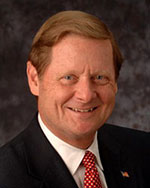Moments in Disability History 23
H.R. 2273 – The ADA in the House of Representatives

U.S. Representative Steny Hoyer and U.S. Senator Orrin Hatch join Justin Dart, Yoshiko Dart, and other advocates in reacting to the Senate's passage of the Americans with Disabilities Act of 1990.
On Tuesday, November 14, 1989, the Education and Labor Committee of the House of Representatives voted 35-0 in favor of a modified substitute Americans with Disabilities Act (H.R. 2273). The modifications were negotiated by Congressman Steny Hoyer (MD), who was overseeing the ADA in the House, and Steve Bartlett (TX), the ranking minority member of the Select Education Subcommittee.
The modifications were primarily aimed at clarifying parts of the Senate-passed bill (S. 933). The disability community agreed to the modifications. None of the modifications weakened the bill as passed by the Senate, however, the Committee defeated eight amendments aimed at weakening the coverage of the ADA. Most of these amendments were prepared in response to concerns raised by businesses and public transit operators about compliance costs.
The process was not yet over for passage of H.R. 2273. Three other House committees had jurisdiction over the bill: Judiciary; Energy and Commerce; and Public Works and Transportation.
One controversial amendment approved by the House was introduced by Jim Chapman (TX) at the request of the National Restaurant Association to give restaurant owners the statutory authority to shift persons with AIDS or HIV infections out of food handling positions.

Congressman Steny Hoyer

Former Congressman
Steve Bartlett
Congressman Steve Bartlett's March 14, 1988 CSPAN call-in:
http://www.c-span.org/video/?1622-1/callin-representative-steve-bartlett
Representative Tony Coelho of California had been the ADA's original House sponsor.
Tony Coelho continues his advocacy work with the Epilepsy Foundation, carrying a message that emphasizes the importance of educating people about what individuals with disabilities, including individuals with epilepsy, can do in order to change the still prevalent thinking about what they can't do.
After leaving Congress, Coelho asked his closest friend Maryland Representative Steny Hoyer to take over. What most people did not know was that, like Coelho, Representative Hoyer's wife had epilepsy.
Congressman Hoyer's remarks on the 20th Anniversary of the ADA can be found on this link:
https://hoyer.house.gov/content/congressman-steny-hoyer-delivers-remarks-20th-anniversary-celebration-americans-disabilities







